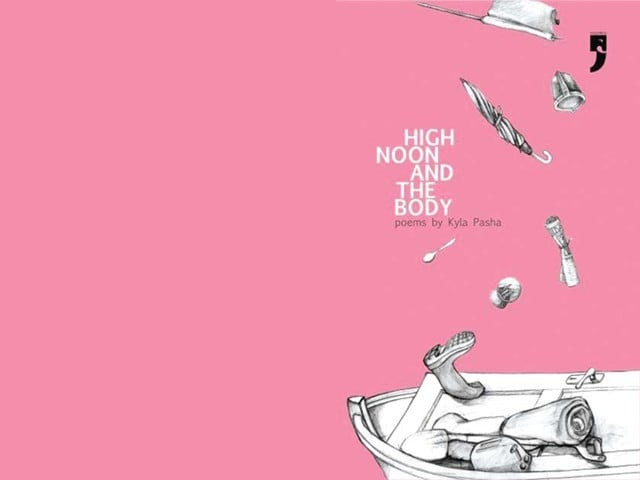Sit still, doubting Thomases. You are about to be whacked by an exception. Kyla Pasha’s book of poems, High Noon and the Body, is good, better than good—very good, even. And since I am short on words, here’s what I’m going to summarily advise you, in all seriousness: if you have been paying any attention to South Asian writing in English, fork some of it out here immediately. Here’s a voice that is fresh and startling, and distills language with the deftness of a pro. And if you don’t believe me, here’s a sample, which is not even representative of the best poems in this collection (yeah, long poems, word count, exacting editor, life).
To Pack a Boat
To set a boat out to sea and leave it there,
you need firm hands and strong legs,
a mind for numbers, inventory,
and you should know how to pack a boat for a long way.
I can smooth with my hand and I can fit
things in corners,
but I cannot break the bottle for blessing;
I cannot sing the leaving song;
I cannot lay flowers;
and I never really can back the boat.
To send a boat away, you need breath
in your lungs and a hanky to wave,
and I haven’t – though I would like you to leave,
without leaving behind what you would,
without blessing the shore right back
I would have you out to sea and away –
But these last things I cannot do, so, go,
or you will stay.
The interesting bit in the first stanza is how the literal (firm hands and legs) tapers into the figurative (mind for numbers, inventory), followed by the confessions of a narrator who seems unable or unwilling to carry out the rituals of farewell. The real special bit comes later in the second stanza, after the hyphen (I would have you out to sea and away –). The syntax alters from here onward and cracks appear in this well-rehearsed, almost hackneyed laundry list of objects that sum up farewell rituals, and most importantly: there is a sudden dash of vagueness in the poem (without leaving behind what you would,/ without blessing the shore right back/ I would have you out to sea and away): you are not told what will be left behind, why the sudden urge to have the beloved out to sea and away. The reader realizes the narrator has reached the limit of the ritual of speaking kind words at the farewell, and the poem itself stands interrupted and ends in an uneasy, unresolved silence (these last things I cannot do, so, go,/ or you will stay).
Once you’re done reading the book, look up Kyla Pasha for an autograph. She lives in Lahore and deserves lots of adulation for making fine, lovely things.
Published in The Express Tribune.



COMMENTS
Comments are moderated and generally will be posted if they are on-topic and not abusive.
For more information, please see our Comments FAQ